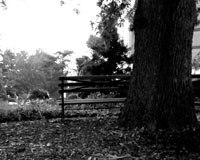
The Letter Throws Open the Vowel's Crypts
The Letter Throws Open the Vowel's Crypts
1.
Black as a blizzard,
the letter throws open the vowels’ crypts.
There will be neither today nor tomorrow, there will be neither sky nor earth. “The true sky, indeed, is everywhere, including even the place whereon you stand and past which you walk.”*
Not everything that the letter begins the word ends: not everything that is a word finds space on the reef of the name; not everything that is part of a name enters into the inscription on crosses, just as the image in a mirror is not identical to the person mirrored in it.
Thus we stand above the letter
like pilgrims above a well
like grace above cemeteries
* Jakob Böhme
2.
Black, like the loneliness of a blind eye above a glass of alcohol
The entrance of the first angel into the room is unforeseeable. The second finds the tunnel of mourning in your eye. “Tell me, which of you will pay the price of death to spend a night with me?”*
Only a hand with fingernails can reach the page. You write with them. The first letter lingers a long while in its white spaces like crosses at a crossroads around which the wind whistles and the ravens croak. The second letter has a snake’s tail that it coils around the third one.
The text looks like the art of mummification: you have removed the viscera. Who is the dead man when you write about death?
* A. S. Pushkin
3.
Black, the lichens around the letter begin to shiver.
They seem the narrowest capillaries through which the letter receives blood as the bramble received sap through the rotten clay.
You reach your hand out for her hips like a lover’s. You open her arabesques as you open your woman’s knees on your wedding night.
Now you feel the fiery lines of the hieroglyph clasping you like a ring.
To whom does the poem wed us?
4.
Where there are letters there will always be a Garden of Gethsemane
Around one of them, it’s Midnight, around another it’s Midday.
The letter that bears the venom is among the others, just like belladonna among the plants in the grove. Around each of them, wild beasts gather. Some will follow you in other letters:
like Breughel’s blind men on the brink of the abyss
the letters cling to others on the page
who walks on before them? Who follows after?
5.
To each his letter.
Inside, it’s warm and comfortable. My beloved dead lie here: father and mother. And my patient forebears. And my son watching me
Thus we stand above the letter
like pilgrims above a well
like grace above cemeteries
6.
At Midday and at Midnight the letters
fall away from my brain like rocks in the mountains. In their place remain caves where poisonous herbs sprout. Others remain empty and the phosphorous bees take them for beehives.
Like a blizzard around the letters is the poem.
Put on the mask and the bearskin turned inside-out. The letter does not need to know your name.
George Vulturescu is the author of more than a dozen books of poetry, among them The North and Beyond the North (2001), Monograms on the Stones of the North (2005), Other Poems from the North (2007; The Blind Man from the North (2009); and Gold and Ivy (2011). Not surprisingly, he was born, and lives, in the north of Romania in the province of Satu Mare, where he works for the cultural administration. Among Vulturescu’s many prizes is the Romanian Cultural Order of Merit for Literature granting him the title of “Cavaler”—that is, “Knight.” In 2011, the dual-language Alte Poeme din Nord / Other Poems from the North, with English translations by Adam J. Sorkin with Olimpia Iacob, appeared in Iași, Romania, from Editura Fundației Culturale Poezia (The Poetry Cultural Foundation Publishing House).Vulturescu’s poems have appeared in Parthenon West, Literary Chaos, Connotation Press, Inventory, Asymptote, Poetry Wales, Levure littéraire, and Rowboat.
Olimpia Iacob is Associate Professor in the Department of Modern Languages at “Vasile Goldiş” West University of Arad, Romania. She graduated from the Faculty of Letters of the “Al. I.Cuza” University (Iași), from which she earned a Ph.D. in 2000 with a dissertation entitled The Translation Theory Applied to the Poetry of Nichita Stănescu. Iacob’s interests include poetics and translation, linguistics, stylistics, and translation studies. Recently she has become a member of the Writers’ Union of Romania. Her book-length translations include works in prose and poetry by Cassian Maria Spiridon, Gabriel Stănescu, Gheorghe Grigurcu, Petre Got, Mircea Petean, and Magdalena Dorina Suciu, as well as George Vulturescu’s Nord și dincolo de Nord / The North and Beyond the North.
Adam J. Sorkin’s translations have won the Poetry Society (U.K.) Prize for European Poetry Translation for 2005, the Kenneth Rexroth Memorial Translation Prize and the Ioan Flora Poetry Translation Prize, among other awards. His recent books include three University of Plymouth Press collections, all translated with Lidia Vianu: Ion Mureșan’s The Book of Winter and Other Poems (2011), Ioan Es. Pop’s No Way Out of Hadesburg (2010), and Mircea Ivănescu’s lines poems poetry (2009); the Ivănescu volume was shortlisted for the 2011 Poetry Society Translation prize. In 2011, Sorkin also published A Path to the Sea by Liliana Ursu, translated with Ursu and Tess Gallagher (Pleasure Boat Studios—ForeWord Reviews Silver Award winner in poetry), and Ioan Flora’s Medea and Her War Machines, translated with Alina Cârâc (University of New Orleans Press—third-round selection, National Translation Award), as well as The Vanishing Point That Whistles: An Anthology of Contemporary Romanian Poetry (Talisman House). In 2012, Mouths Dry with Hatred by Dan Sociu, translated with Sociu (Longleaf Press), and The Flying Head by Ioan Flora (Toad Press), both appeared. Sorkin is Distinguished Professor of English, Penn State Brandywine.

